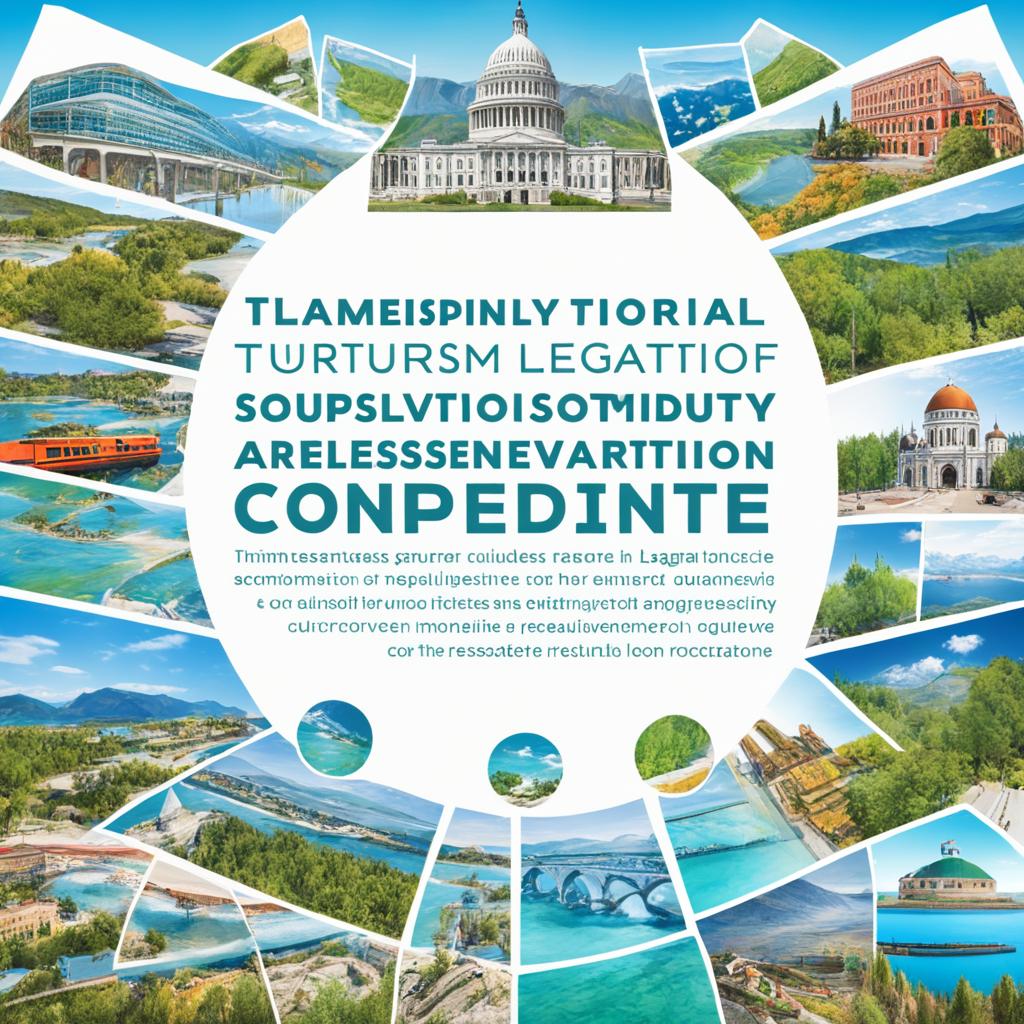Have you ever wondered what sets the rules and regulations for the travel and tourism industry? How are businesses and travelers protected? Understanding the basic concepts of tourism law is paramount to comprehending the legal framework that governs this dynamic and ever-growing sector. From travel as a legal right to establishing mechanisms for redressal, these concepts shape the industry and ensure the well-being of both businesses and travelers.
The Importance of Tourism Law in the Industry

Tourism law plays a crucial role in the travel industry as it provides a regulatory framework that ensures the smooth functioning of businesses and protects the rights and interests of both travelers and service providers. The implementation of tourism laws helps in maintaining safety standards, ensuring fair practices, promoting sustainable tourism, and resolving disputes. It also fosters trust and confidence among stakeholders and contributes to the overall growth and development of the industry.
By establishing clear rules and guidelines, tourism law ensures that businesses in the industry operate in compliance with regulations. This not only enhances the credibility and reputation of the industry but also helps protect consumers from unfair and deceptive practices. For example, tourism laws may require the provision of accurate and truthful information by travel agencies and tour operators, preventing misleading advertising and fraudulent activities that could harm unsuspecting tourists.
Furthermore, tourism law is essential in maintaining safety standards within the industry. It establishes regulations for tour operators, accommodation providers, and transportation services, ensuring that they meet certain requirements to guarantee the well-being of travelers. This includes measures such as regular safety inspections, adherence to hygiene standards, and proper licensing and certification for tourism businesses.
Another aspect of the importance of tourism law is its role in promoting sustainable tourism practices. Environmental regulations and guidelines are crucial in preserving natural resources, protecting sensitive ecosystems, and minimizing the negative impact of tourism on local communities. Tourism laws may include provisions for waste management, energy conservation, wildlife protection, and responsible tourism practices, all of which contribute to the long-term sustainability of the industry.
In addition to safeguarding the rights of travelers and promoting sustainability, tourism law also plays a significant role in resolving disputes and providing legal remedies. It establishes mechanisms for addressing issues such as consumer complaints, contract disputes, cancellation policies, and compensation for damages. By providing a legal framework for dispute resolution, tourism law ensures that both travelers and service providers have access to fairness and justice.
Overall, tourism law is of utmost importance in the industry as it provides the necessary regulations and protections for stakeholders involved. It maintains safety standards, ensures fair practices, promotes sustainable tourism, resolves disputes, and contributes to the growth and development of the travel and tourism sector. By understanding and complying with tourism laws, businesses can establish trust with consumers, achieve industry standards, and contribute to the positive growth of the industry as a whole.
The Functionality of Tourism Law

Tourism law encompasses a wide range of functional areas that are crucial for the smooth operation and sustainable growth of the travel and tourism sector. These areas are designed to cater to the diverse needs of the industry and ensure the well-being of both tourists and the environment.
One of the primary functions of tourism law is the protection of tourists. It establishes regulations and guidelines to safeguard their rights, safety, and well-being during their travel experiences. This includes measures to prevent fraud, ensure fair treatment, and address issues such as travel insurance, liability, and compensation for any mishaps.
Border controls are another vital aspect of tourism law. Regulations on matters such as visas, immigration, and customs play a crucial role in managing the flow of visitors across international borders. These controls help maintain national security, regulate the entry and exit of tourists, and facilitate the collection of necessary data for tourism statistics and analysis.
Quality of services is a key consideration in tourism law. It ensures that businesses in the industry meet certain standards and provide reliable and satisfactory services to tourists. This includes regulations on accommodation, transportation, food and beverage services, tour operators, and other service providers. By setting quality benchmarks, tourism law promotes customer satisfaction and enhances the overall travel experience.
Environmental protection and conservation are vital components of tourism law. With the growth of tourism, there is an increasing need to preserve natural resources, protect fragile ecosystems, and minimize the negative impact of tourism activities on the environment. Tourism laws establish regulations to promote sustainable practices, manage waste and pollution, protect wildlife habitats, and preserve cultural heritage sites and monuments.
Economic development is another area addressed by tourism law. It encompasses regulations that promote investment in the tourism industry, facilitate job creation, and foster economic growth in both local and national contexts. This includes measures to attract tourism-related businesses, encourage entrepreneurship, and ensure fair competition among industry players.
Tourism law also governs the relationship between various segments of the tourism industry. It establishes rules and regulations to foster cooperation, coordination, and collaboration among stakeholders such as hotels, airlines, tour operators, travel agencies, and local communities. By promoting synergy among these different entities, tourism law aims to enhance the overall efficiency and effectiveness of the industry.
In summary, the functionality of tourism law covers a wide range of areas that are essential for the smooth functioning and sustainable growth of the travel and tourism sector. These areas include the protection of tourists, border controls, quality of services, environmental protection, conservation of historical sites and monuments, economic development, and the relationship between various segments of the tourism industry. By addressing these aspects, tourism law ensures the well-being of tourists, the protection of the environment, and the overall success of the industry.
Sources of Tourism Law
Tourism laws are derived from a variety of sources, serving as the legal foundation for regulations in the travel and hospitality industries. These sources include:
- National Constitutions
- Common Law
- Administrative Law
- Treaties
- Statutes
In the United States, both the federal government and individual states contribute to the development of tourism laws and regulations. This ensures a comprehensive and coordinated approach to governing the industry at both national and local levels.
On the other hand, in India, tourism-related regulations can be found in different lists, such as the Union list, Concurrent list, and State list. These lists distribute legislative powers between the central government and the state governments, enabling the establishment of tourism laws that cater to the specific needs of different regions and communities.
The diverse sources of tourism law play a crucial role in shaping the regulations and policies that govern the travel and hospitality sectors in the United States and India.
| Source | United States | India |
|---|---|---|
| National Constitutions | ✔️ | ✔️ |
| Common Law | ✔️ | ✔️ |
| Administrative Law | ✔️ | ✔️ |
| Treaties | ✔️ | ❌ |
| Statutes | ✔️ | ✔️ |
The Need for Comprehensive Tourism Legislation

The evolving nature of the tourism industry has led to the need for comprehensive tourism legislation that encompasses all aspects of the sector. While travel and accommodation have long been regulated, new areas such as tourist safety, health and hygiene, protection of privacy, and environmental sustainability require inclusion in tourism legislation. A comprehensive approach ensures that all segments of the industry are covered and that the rights and responsibilities of both service providers and tourists are clearly defined.
As the tourism industry continues to thrive, it is crucial to establish comprehensive legislation that addresses the challenges and demands of this ever-expanding sector. The diverse nature of tourism involves various stakeholders and sectors, ranging from transportation and accommodation to recreational activities and cultural experiences. Without comprehensive legislation, the industry may face numerous gaps and inconsistencies that could undermine its growth and potential.
Comprehensive tourism legislation plays a vital role in regulating the industry and ensuring that businesses meet specific standards and obligations. These laws provide a framework for the protection of tourists, preservation of natural resources and cultural heritage, and effective management of tourism-related activities. By establishing clear guidelines and regulations, comprehensive legislation promotes responsible practices, enhances the overall guest experience, and safeguards the interests of both travelers and service providers.
Moreover, comprehensive tourism legislation enables governments to manage and monitor the impact of tourism on local communities, economies, and the environment. It allows for the implementation of sustainable practices that minimize negative effects and promote long-term conservation and socio-economic development. By addressing emerging issues such as overtourism, climate change, and digital disruption, comprehensive legislation ensures the industry’s relevance, resilience, and adaptability in an ever-changing global landscape.
In conclusion, given the multifaceted nature of tourism, the industry requires comprehensive legislation to effectively address the complexities and challenges it faces. A comprehensive approach to tourism legislation guarantees the protection of tourists, sustainable development of destinations, and the harmonious functioning of diverse sectors. As tourism continues to grow, comprehensive legislation becomes imperative in managing the industry’s impact, ensuring the well-being of travelers, and fostering sustainable growth in the global tourism landscape.
Tourism Laws in India
In India, tourism laws play a crucial role in regulating and protecting various aspects of the industry. These laws cover a wide range of areas to ensure the smooth functioning and preservation of the tourism sector. Let’s take a closer look at some of the key tourism laws in India:
1. Protection of the Environment: India has enacted laws that aim to protect the environment from the adverse impacts of tourism activities. These laws include regulations for waste management, conservation of natural resources, and promotion of sustainable tourism practices.
2. Conservation of Monuments: India is home to numerous historical sites and monuments of cultural significance. To safeguard these treasures, tourism laws have been established to regulate the preservation, restoration, and maintenance of these monuments.
3. Protection of Tourists and Their Health: The safety and well-being of tourists are of utmost importance. Tourism laws in India provide measures to ensure the protection of tourists and their health, including regulations for accommodation standards, emergency services, and consumer protection.
4. Regulations for Businesses and Commerce: To promote fair practices and accountability, India has implemented tourism laws governing businesses and commerce in the industry. These regulations cover areas such as licensing, taxation, competition, and operational standards.
5. Regulations for Industries and Labor: Tourism laws in India also address the rights and welfare of workers in the industry. These laws outline provisions related to labor rights, fair employment practices, working conditions, and social security benefits.
6. Social Welfare Laws: The tourism sector can significantly impact local communities. India has enacted social welfare laws to ensure that the benefits of tourism reach all strata of society, particularly marginalized groups and rural communities.
7. Licenses Applicable to Hospitality Organizations: Hospitality organizations, such as hotels and resorts, are required to obtain specific licenses and comply with regulations to ensure the safety and well-being of guests. Tourism laws in India outline the licensing procedures and requirements for these establishments.
8. Laws Related to Foreign Tourists: India welcomes a large number of foreign tourists each year. To facilitate their visit and ensure their safety, there are specific laws in place that govern visa regulations, travel permits, and the protection of foreign tourists’ rights.
9. Laws Related to Transportation: Efficient transportation is essential for the smooth movement of tourists. India has established laws to regulate various modes of transportation, including road, rail, air, and water transport, to ensure safety, accessibility, and convenience for tourists.
10. Laws Related to Criminal Activities: The safety and security of tourists are paramount. Tourism laws in India address criminal activities such as theft, harassment, fraud, and other offenses that may affect the well-being and experience of tourists.
These tourism laws in India signify the government’s commitment to the well-being of tourists, the preservation of the environment and cultural heritage, and the sustainable growth of the tourism industry.
Key Tourism Laws in India
| Area | Corresponding Laws |
|---|---|
| Protection of the Environment | Environmental Protection Act, Wildlife Protection Act |
| Conservation of Monuments | Ancient Monuments and Archaeological Sites and Remains Act |
| Protection of Tourists and Their Health | Tourist Protection Act, Consumer Protection Act |
| Regulations for Businesses and Commerce | Hotel and Restaurants Act, Competition Act |
| Regulations for Industries and Labor | Minimum Wages Act, Employees’ State Insurance Act |
| Social Welfare Laws | Social Security Act, Scheduled Castes and Scheduled Tribes (Prevention of Atrocities) Act |
| Licenses Applicable to Hospitality Organizations | Hotel and Restaurants Licenses Act, Food Safety and Standards Act |
| Laws Related to Foreign Tourists | Foreigners Act, Visa Regulations |
| Laws Related to Transportation | Motor Vehicles Act, Airports Authority of India Act |
| Laws Related to Criminal Activities | Indian Penal Code, Criminal Law Amendment Act |
Impact of Tourism Law on the Industry
The implementation and enforcement of tourism laws have a significant impact on the travel industry. These laws play a crucial role in regulating and shaping the operations of businesses within the sector, ensuring compliance with legal requirements and maintaining a level playing field.
Tourism laws also prioritize the protection of the rights and interests of travelers. By establishing guidelines and regulations, they promote responsible tourism practices that safeguard the well-being and satisfaction of tourists.
Additionally, tourism laws contribute to the growth of the industry. By providing a legal framework, these laws create a conducive environment for businesses to thrive, encouraging investment and innovation. This, in turn, leads to increased job opportunities and economic growth.
Moreover, tourism laws prioritize the compliance of businesses with regulations related to sustainability, environmental protection, and community development. By enforcing these regulations, tourism laws contribute to the preservation and conservation of natural resources and cultural heritage.
Overall, the impact of tourism law on the industry is multi-faceted, with its regulation, compliance, and protection measures fostering growth, sustainability, and responsible practices in the travel and tourism sector.
Future Trends in Tourism Law
The field of tourism law is constantly evolving to keep up with the emerging areas, advancements in technology, and shifting societal values. As the industry continues to grow and adapt to new challenges, future trends in tourism law are expected to focus on several key areas.
One of the major trends is the digitalization of the travel industry. With the rise of online booking platforms, mobile apps, and digital payment systems, there is a need for regulations that ensure the security and privacy of travelers’ personal information. Data privacy laws and regulations will play a crucial role in safeguarding travelers’ data and maintaining trust in the industry.
Sustainability and environmental protection will also be key considerations for future tourism laws. As more travelers become conscious of their environmental impact, there will be a greater emphasis on promoting sustainable tourism practices. Laws and regulations will focus on encouraging responsible tourism, protecting natural resources, and minimizing the carbon footprint of the industry.
Furthermore, with the emergence of new forms of tourism such as ecotourism, adventure tourism, and cultural tourism, there will be a need for specific regulations to address the unique challenges and opportunities presented by these niche areas. Tourism laws will need to strike a balance between facilitating the growth of these emerging forms of tourism while ensuring the protection of both travelers and local communities.
FAQ
Q: What are the 7 basic concepts of tourism law?
A: The 7 basic concepts of tourism law include recognizing travel as a legal right, ensuring safe and adequate accommodations, providing reliable transportation, granting access to accommodations for all travelers, maintaining reasonable travel and accommodation costs, regulating the travel and tourism industry, and establishing a mechanism for redressal of rights and regulations.
Q: What is the importance of tourism law in the industry?
A: Tourism law plays a crucial role in the travel industry as it provides a regulatory framework that ensures the smooth functioning of businesses and protects the rights and interests of both travelers and service providers. The implementation of tourism laws helps in maintaining safety standards, ensuring fair practices, promoting sustainable tourism, and resolving disputes.
Q: What is the functionality of tourism law?
A: Tourism laws cover a wide range of functional areas to cater to the diverse needs of the industry. These areas include the protection of tourists, border controls, quality of services, environmental protection, conservation of historical sites and monuments, economic development, and the relationship between various segments of the tourism industry. Each of these areas plays a vital role in ensuring the smooth operation and sustainable growth of the travel and tourism sector.
Q: What are the sources of tourism law?
A: Tourism laws derive from various sources, including national constitutions, common law, administrative law, treaties, and statutes. In the United States, both the federal government and individual states contribute to tourism law, whereas in India, tourism-related regulations can be found in the Union list, Concurrent list, and State list. These sources provide the legal basis for the establishment of tourism laws and regulations in different countries.
Q: Why is there a need for comprehensive tourism legislation?
A: The evolving nature of the tourism industry has led to the need for comprehensive tourism legislation that encompasses all aspects of the sector. While travel and accommodation have long been regulated, new areas such as tourist safety, health and hygiene, protection of privacy, and environmental sustainability require inclusion in tourism legislation. A comprehensive approach ensures that all segments of the industry are covered and that the rights and responsibilities of both service providers and tourists are clearly defined.
Q: What are the tourism laws in India?
A: In India, there are various tourism laws that cover different aspects of the industry. These laws include those related to the protection of the environment, conservation of monuments, protection of tourists and their health, regulations for businesses and commerce, regulations for industries and labor, social welfare laws, licenses applicable to hospitality organizations, laws related to foreign tourists, laws related to transportation, and laws related to criminal activities. Each of these laws serves the purpose of ensuring the smooth functioning and protection of the tourism sector in India.
Q: What is the impact of tourism law on the industry?
A: The implementation and enforcement of tourism laws have a significant impact on the travel industry. It ensures that businesses operate in compliance with legal requirements, maintains a level playing field, protects the rights and interests of travelers, promotes responsible tourism practices, and fosters overall industry growth. By providing a legal framework, tourism law contributes to the sustainable development and success of the travel and tourism sector.
Q: What are the future trends in tourism law?
A: The field of tourism law is continuously evolving to address emerging areas and keep pace with advancements in technology and changes in societal values. Future trends in tourism law are expected to focus on areas such as digitalization, data privacy, sustainability and environmental protection, and new forms of tourism. As the industry continues to grow and adapt to new challenges, the development of laws and regulations will play a crucial role in shaping its future trajectory.
